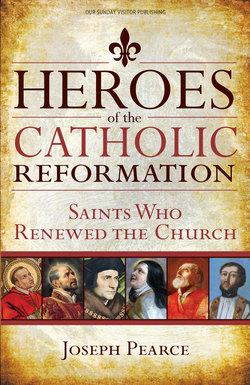Читать книгу Heroes of the Catholic Reformation - Joseph Pearce - Страница 8
На сайте Литреса книга снята с продажи.
ОглавлениеPrologue
On Heroes and Holiness
I think that beauty and love, and things which people generally look down upon as not stoic or heroic, are the essence of heroism and manly feeling, and this because they are the essence of God as we hear of Him and understand Him. I felt this in chapel today, that the light feeling which proceeds from love or something beautiful, is not a feeling that will pass, but the happiness of angels in the love of God.
Hilaire Belloc
This is a book about heroes. It’s also a book about saints. In fact, all of the heroes in this book also happen to be saints. This being so, it might serve us well to begin with a discussion of heroism and holiness. What do they have in common? How do they differ?
Let’s begin with the easier of the two.
Holiness, as understood by Christians, is the conforming of our lives to the will of God. In order to do this, we need to love as God loves. “For God so loved the world, as to give his only begotten Son; that whosoever believeth in him, may not perish, but may have life everlasting.”1 God loves in such a way that He lays down His life that we may have the life that He has. “Greater love than this no man hath, that a man lay down his life for his friends.”2 To love as God loves is, therefore, to die. To love is to lay down our lives for our friends. Since we are commanded to love all our neighbors, including those of our neighbors who are our enemies, we are called to lay down our lives even for those whom we don’t like. To do this, to die to ourselves that others might live, is loving as God loves; and, paradoxically, it is also living as God lives. This is holiness.
And so to heroism. On one level, we can say that heroes come in all shapes and sizes, some of which are decidedly ugly. A proud and myopic warrior, such as Achilles, can be seen as a hero. His heroic qualities are measured in terms of his physical might and his prowess as a warrior. It has precious little to do with his humility, or his evident lack thereof. What of those figures whom the world at various times has adulated and idolized, those which it has hero-worshipped? We might think of Alexander the Great or Julius Caesar. Or, more recently, we might recall the way that the dictators of the twentieth century have been hero-worshipped — Lenin, Stalin, Mussolini, Mao, Hitler. More recently still, and descending from the level of the monstrous to the ridiculous, we might think of pop idols who have been worshipped as heroes — Elvis, The Beatles, Michael Jackson. Or we might think of those superheroes which have animated our imaginations with their superpowers, reminding the more literate among us of the pagan gods — Superman, Batman, Spiderman. Continuing the descent, we have the new breed of anti-hero heroes, such as the vampires with which the world seems to have become entranced. What have any of these heroes, idolized by the world, to do with the heroes celebrated in these pages?
The answer, of course, is nothing whatsoever.
There is a world of difference between the sort of heroes whom the world idolizes and the sort of heroes whom Christians venerate. This is simply because there is a world of difference separating the way the world sees itself and the way a Christian sees it. That world of difference, that distance separating the worldly from the otherworldly, is truly abysmal in the sense that the distance between them is an abyss. It is the abyss that separates heaven from hell.3
The heroes whom Christians venerate are those who are in heaven. For a Christian, there is no difference between a saint and a hero.4 The saint is one who has laid down his life heroically in repeated acts of self-sacrifice, dying to himself so that others might live and so that he might himself live as God lives, becoming one with the One who gives all life. A saint is the hero who slays the dragons of sin, with God’s necessary help, rescuing his neighbors in distress from the jaws of death.
These saints, these heroes, these dragon-slayers, come in all shapes and sizes, but they are all worth celebrating. In the following pages, we will celebrate those who fought the dragons of sin and doctrinal error in the turbulent period of the sixteenth century. This was a time in which the Bride of Christ was being assailed by the dragons of secularism, Islam, and heresy. It was for this most holy and venerable damsel in distress that the following heroes gave their lives. As we celebrate them, may they pray for us.
